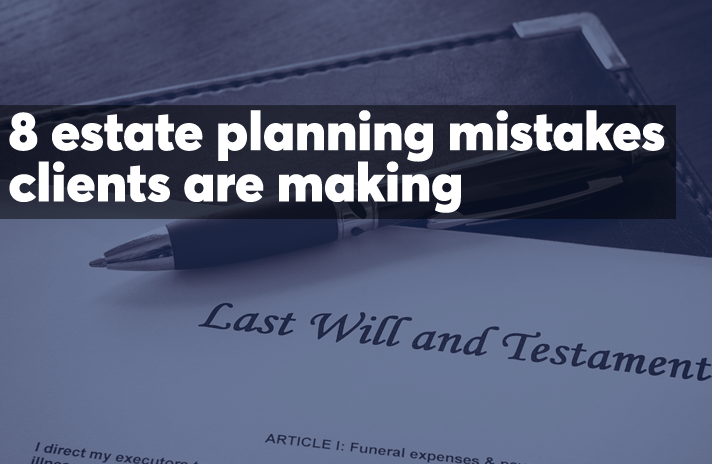
It’s such an unsavory topic that only 42% of U.S. adults have estate planning documents including a will or a living trust, according to a
But, it’s crucial that financial advisors address the matter with their clients and highlight the importance of having a comprehensive estate plan in place.
“We’re trying to make sure that [our clients] can rest easier in the event that something happens to them prematurely,” says planner Michael Shipley of the Raymond James affiliated firm Wagener-Lee. “They should have plans for these things. We see it as more of a relief to them.”
Once you overcome that first hurdle of opening the discussion with your client, the next step is navigating the complex issues that can arise during the estate-planning process.
Planners Stephanie Sandle, a 16-year industry veteran and managing director at MAI Capital Management and Richard Wagener, 40-year industry veteran and managing partner at Wagener-Lee, discuss what they say are the most common mistakes clients make in the estate planning process.
Scroll through to see the top eight estate planning mistakes clients make.

Having no plan at all
“If a client’s wealth is greater than the lifetime estate tax exemption of $11,180,000 per person, their beneficiaries will receive less wealth as a portion of it will go to pay the highest estate tax as no estate tax minimization techniques will be utilized,” she notes.
“Procrastinating is another facet of not having an estate plan,” Sandle continues. “This could prove very costly to a high-net-worth individual as the value of the estate could increase, causing them to use more of their exemption and a more complex estate plan to get assets out of their estate.”

Not having proper directives in place
“The Health Care Power of Attorney and Durable Power of Attorney are necessary to make sure a person the client choses will be able to make health care and financial decisions for them should they be incapacitated,” Sandle explains. “If they do not have these in place it may be up to a court to
determine who should make the decisions for them.”
Having these documents in place for anyone over the age of 18 is also important. If something were to happen to a child that is legally considered an adult, parents may not be able to make important decisions on their behalf.

Naming an inappropriate guardian for children
“My daughter has a nine-year-old and is 40 years old,” Wagener explains. “Suppose she names me and her mother as the guardian to raise her son. We’d love that but [we] may not be the appropriate [people] to name because when that child is 19, maybe the [grandparents] are in their 70s and physically or mentally unable to do that.”

Not updating documents

Equally distributing assets among heirs
“Sometimes equalization of assets is a mistake that we find without regard to the age or the need of the child,” Wagener says. “The older child sometimes gets a bigger benefit because they’ve lived longer and had mom and dad support them for a longer period of time. The younger child sometimes gets stuck with expenses that mom and dad normally took out of the entire pot.”

Failure to properly title assets
“I had a client who stated that they were all set as they had the trust set up and their wishes detailed in it,” Sandle says. “However, nothing was titled in the name of the trust. If the client had passed away, their ultimate wishes would not have been carried out.”
The issues of titles are complex, but important to ensure client assets pass according to their estate plan and also when evaluating income tax consequences.

Not keeping an advisor in the loop
“Even if I’m not an attorney I can still advise clients on things they should discuss with the attorney,” Wagener says. “Sometimes we’ll take a look at the document and notice there was something missing.”






